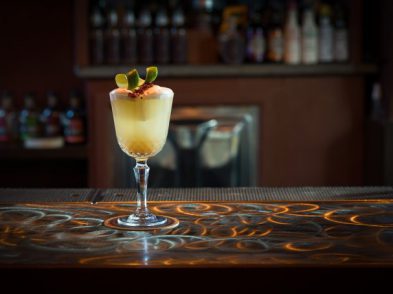If you’ve just arrived in Italy and are kicking for a little avventura italiana, you’re probably still feeling excited and optimistic. Most likely you’re convinced that if you ever decided to stay long term, you’d never get homesick enough to miss something as trivial as Jell-O. Maybe you won’t. But some of us are not that strong. Some of us get to the point where Jell-O becomes the source of a high-profile cultural crisis.
If you know people outside of Italy who love you, one of them might get the brilliant idea of sending you imported treats like Pop Rocks and Fruit Roll-ups. If someone does, be careful with whom you share them. Things like that don’t exist in Italy. Italians love food, but they simply don’t like to play with it. Non fa parte della nostra mentalità, it’s not part of our mentality. My first year in Italy, a friend sent me lime Jell-O, which at the time was the equivalent of green gold. Eager to share my edible treasure, I invited my cousin Leonardo to experience one of the true joys of American cuisine.
When he is not busy infuriating me, Leo is one of my favorite people in the world. My summer partner-in-crime growing up, he was my first and best Italian culture teacher. He was privy to all sorts of scary Italian knowledge that all children should be safely versed in. For instance, leaving an uneaten grain of rice on your plate will keep you out of paradise; rotting pomegranates in your fruit bowl will earn you wealth one day; and the smell of stinky feet can blind you. As far as I could see, Leo deserved a taste of American culture for a change.
It is not often that one gets to act like a mad scientist, unveiling a discovery that could revolutionize European culture in one’s lifetime, but that is how I felt as I pulled the top off my Jell-O container.
“You’ll love it!” I told my cousin as I set out the cups, barely able to contain my excitement.
Leo, however, didn’t share my enthusiasm. “Sorry,” he said, shaking his head, “but we don’t eat green slime food in Italy. Non fa parte della nostra mentalità. It’s not part of our mentality.”
I stared. “You mean you’ll eat donkey stew, goat brains, and cow kidneys but you will not eat lime-flavored gelatin?”
“I just don’t share your passion for edible rainbows,” he smiled wryly. “Don’t take offense.”
I should have known. Because they boast the world’s best cuisine, Italians have no reason to be adventurous eaters. Most prefer to avoid the unknown at all costs. Still, I glared at my cousin, incredulous. Leo was snubbing my Jell-O. If there were ever a reason for harboring silent lifelong resentment, this was it.
“I’m not offended,” I said, slamming down the serving spoon. The Jell-O trembled a bit in its bowl. I was not going to cry, though. Crying over dessert is definitely wimpy.
“Don’t be so americana and tell me you are not offended when you are,” he said.
“Don’t you tell me what to be!”
My cousin is often an idiot, but he was smart enough to know that he had somehow really hurt my feelings. He tried again.
“It’s nothing personal, Linda. But why eat something that probably cannot be considered food? Non fa parte della nostra mentalità,” he repeated. “It’s just not part of our mentality.”
“Jell-O is not part of the mentality?”
“No.”
“Who cares about your mentality! Lots of things around here are not part of la mia mentalità. I do them anyway. It’s called being adventurous! It’s called being open-minded. It’s called being polite!”
“It’s called food poisoning!” my cousin grinned. Leo would not give up. He had spent all his life in a culture where he could joke his way out of anything. Apparently, he had never used his Italian charm on Jell-O before.
Then something unexpected happened. I don’t know what made him do it, but perhaps he knew he was really in trouble. Leo stacked his fork and knife onto his abandoned plate and brought it into the kitchen. Angry or not, I was witnessing a miracle. I don’t think he had ever cleared the table in his own house before. As an Italian son, taking his dish to the sink was also not parte della sua mentalità.
Then my cousin stuck his head out of the kitchen doorway, looking sheepish and loveable even if I didn’t like him at all. He raised his eyebrows and then winked.
“Come on, lovely, let’s eat that gello before it melts. Let’s eat it in front of the TV so I can be a true americano.”
“Impossibile.”
“Come on! I will tell you it’s good. I promise.”
“Too late, Leo.”
“You americani show no mercy. That is why you have capital punishment.”
I looked at my cousin. “Why do you have to make everything into a cultural issue? Can’t it just be about two people eating dessert, no matter what country they’re from? I think if you prepare a dessert and your friends refuse to eat it, they’re being rude no matter what country they’re in.”
“In Japan, men who eat desserts are considered softies.”
“Do you have to know everything? Can’t we just have a simple conversation with no cultural trivia in it?”
Leo was having a hard time. He looked down and decided he was going to have to play it my way.
“I’m sorry I hurt your feelings about your dessert.” He said it very quietly and his apology made me want to forgive him. It would be enough, I decided, if he would just understand one simple thing.
“There’s something you should know about Jell-O, Leonardo. And that is—Jell-O is important to me.”
“Alright,” he said. “Should we eat it then?”
“I’m still kind of mad.”
“Alright, we should eat it then,” he said, piling a wobbly spoonful into his mouth. “It’s good,” he told me.
“We made Jell-O brains in the fifth grade,” I said, my enthusiasm suddenly returning.
Leo couldn’t see why one would eat Jell-O, but he could definitely conceive making a science experiment out of it. “Do you think that if I threw this at your head it would bounce back?”
Reaching high levels of cultural understanding and mutual respect for cultures is quite a challenge. Maybe world leaders should eat Jell-O together, that’s Leo’s final analysis. It’s true. How serious can you be about your own little issues when you are eating a food that bounces?








